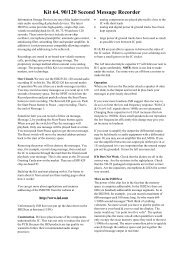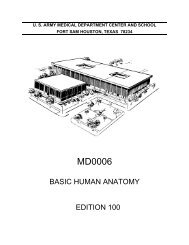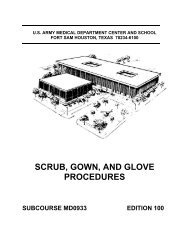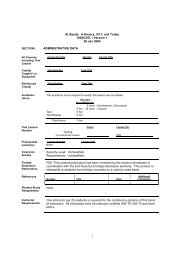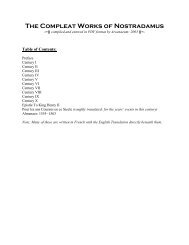Download This File - The Free Information Society
Download This File - The Free Information Society
Download This File - The Free Information Society
Create successful ePaper yourself
Turn your PDF publications into a flip-book with our unique Google optimized e-Paper software.
<strong>The</strong> DEA’s success in curbing PCP trafficking continued on<br />
December 17, 1978, when it completed one of the largest PCP<br />
seizures in the agency’s history. In a pre-dawn search, more<br />
than 50 special agents and several deputies confiscated $300<br />
million worth of PCP in a clandestine lab in Los Angeles.<br />
Upwards of 900 pounds of PCP, in either the finished or<br />
intermediate stage, was seized. <strong>This</strong> quantity of PCP would<br />
have yielded 36 million dosage units. A large amount of lab<br />
equipment, including a sophisticated high-speed pill press,<br />
was also seized. Five suspects were arrested at the scene.<br />
Colombian Marijuana<br />
In the mid-to-late 1970s, trends in drug abuse were beginning<br />
to change. In fact, drug smuggling was taking on an entirely<br />
different scope. Cocaine and Colombian marijuana had become<br />
the drugs of choice, and the burgeoning drug<br />
organizations in Colombia took full advantage of new markets<br />
in the United States. It was no longer unusual for law<br />
enforcement to seize cocaine in 100-pound shipments. Also,<br />
marijuana was being shipped to the United States in ton<br />
quantities, as evidenced by a 113-ton seizure from a single ship<br />
off the northeastern coast of Florida in August 1978.<br />
Colombian marijuana, or “Colombian Gold,” a highly potent<br />
marijuana, was reaching the United States in “mother ships,”<br />
which were large maritime vessels that carried bulk shipments<br />
of marijuana to prearranged points off the U.S. coast. <strong>The</strong>se<br />
ships were moored far enough away from the shore to avoid<br />
notice, and off-loaded smaller quantities of the drug to smaller<br />
yachts, “go fast” boats, and fishing vessels that could smuggle<br />
the drug ashore less conspicuously and avoid detection by<br />
law enforcement. During the mid-to-late 1970s and early 1980s,<br />
the DEA conducted a number of notable operations targeting<br />
the organizations behind these mother ships. One such<br />
program, Operation Stopgap, was created in December 1975.<br />
As part of this program, DEA pilots flew up and down the coast<br />
of La Guajira, Colombia, which was a major source of drug<br />
smuggling. <strong>The</strong>y reported suspect vessels to the DEA’s El<br />
31<br />
Carlo Boccia (right),<br />
coordinator of a special<br />
operation that targeted PCP<br />
distribution and abuse, was<br />
photographed consulting with<br />
Special Agent Joe Brzostowski,<br />
who helped initiate the<br />
operation in 1978.<br />
<strong>The</strong> lab was by far the largest of its kind ever dismantled in the<br />
West and one of the largest of any type ever seized in the<br />
United States. <strong>The</strong> seizures and arrests concluded a year-long<br />
joint investigation between the DEA and the Los Angeles<br />
Sheriff’s Department.<br />
Pictured above are porcelain vases concealing thai-sticks<br />
(marijuana) that were confiscated as part of a 1977<br />
seizure of 100 pounds of thai-sticks in Tijuana, Mexico.<br />
Paso Intelligence Center, which then relayed the information<br />
to U.S. Coast Guard cutters. <strong>The</strong> operation also used U.S.<br />
Navy satellites to track the suspect vessels.<br />
By 1978, Operation Stopgap effectively reduced the flow of<br />
marijuana from Colombia to the United States by at least onethird.<br />
<strong>The</strong> Stopgap program seized over one million pounds<br />
of marijuana. <strong>The</strong>se significant seizures caused the price of



